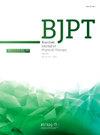Physical therapist-delivered motivational interviewing and health-related behaviour change: A systematic review and meta-analysis
IF 3.1
3区 医学
Q1 ORTHOPEDICS
引用次数: 0
Abstract
Background
Motivational interviewing (MI) promotes health-related behaviour change and improves patient health outcomes, but the effect of physical therapist-delivered MI is unclear.
Objective
To evaluate the effect of physical therapist-delivered MI on health-related behaviour change in adults attending physical therapy or rehabilitation.
Methods
CINAHL, Medline, PubMed, PEDro, Embase, and Cochrane databases were searched in August 2023. Randomised controlled trials evaluating physical therapist-delivered MI and health-related behaviour change were included. Internal validity was evaluated using the PEDro scale. GRADE approach was used for each meta-analysis.
Results
Ten publications from nine randomised controlled trials involving 909 participants were included. Physical therapist-delivered MI likely increased physical activity slightly (SMD 0.21, 95 % CI -0.05, 0.47) when compared to minimal intervention; however the evidence is very uncertain in relation to self-efficacy (SMD 0.51, 95 % CI -0.35, 1.38) and health-related quality of life (SMD 0.73, 95 % CI -0.64, 2.11). When physical therapist-delivered MI was combined with and compared to rehabilitation, there were no additional effects on physical activity (SMD 0.02, 95 % CI -0.37, 0.41), health-related quality of life (SMD 0.18, 95 % CI -0.27, 0.63), or endurance (SMD 0.15, 95 % CI -0.21, 0.52) and a likely small effect on self-efficacy (SMD 0.23, 95 % CI -0.1, 0.55).
Conclusion
Physical therapist-delivered MI is likely to produce a small improvement in physical activity, but only in the absence of other comprehensive rehabilitation. The most beneficial application of MI may be for patients who are not receiving rehabilitation or who have low levels of motivation and self-efficacy.
物理治疗师提供的动机访谈和健康相关行为改变:系统回顾和荟萃分析。
背景:动机性访谈(MI)促进与健康相关的行为改变并改善患者的健康结果,但物理治疗师提供的MI的效果尚不清楚。目的:评估物理治疗师提供的心肌梗死对参加物理治疗或康复的成人健康相关行为改变的影响。方法:检索于2023年8月的CINAHL、Medline、PubMed、PEDro、Embase和Cochrane数据库。纳入评估物理治疗师提供的心肌梗死和健康相关行为改变的随机对照试验。使用PEDro量表评估内部效度。每次荟萃分析均采用GRADE方法。结果:纳入了9项随机对照试验的10篇出版物,涉及909名受试者。与最小干预相比,物理治疗师提供的心肌梗死可能会略微增加身体活动(SMD为0.21,95% CI为-0.05,0.47);然而,有关自我效能(SMD 0.51, 95% CI -0.35, 1.38)和健康相关生活质量(SMD 0.73, 95% CI -0.64, 2.11)的证据非常不确定。当物理治疗师提供的心肌梗死与康复相结合并进行比较时,对身体活动(SMD为0.02,95% CI为-0.37,0.41)、健康相关生活质量(SMD为0.18,95% CI为-0.27,0.63)或耐力(SMD为0.15,95% CI为-0.21,0.52)没有额外的影响,对自我效能的影响可能很小(SMD为0.23,95% CI为-0.1,0.55)。结论:物理治疗师提供的心肌梗死可能会对身体活动产生微小的改善,但仅在没有其他综合康复的情况下。心肌梗死最有益的应用可能是那些没有接受康复治疗或动机和自我效能水平较低的患者。
本文章由计算机程序翻译,如有差异,请以英文原文为准。
求助全文
约1分钟内获得全文
求助全文
来源期刊
CiteScore
6.10
自引率
8.80%
发文量
53
审稿时长
74 days
期刊介绍:
The Brazilian Journal of Physical Therapy (BJPT) is the official publication of the Brazilian Society of Physical Therapy Research and Graduate Studies (ABRAPG-Ft). It publishes original research articles on topics related to the areas of physical therapy and rehabilitation sciences, including clinical, basic or applied studies on the assessment, prevention, and treatment of movement disorders.

 求助内容:
求助内容: 应助结果提醒方式:
应助结果提醒方式:


